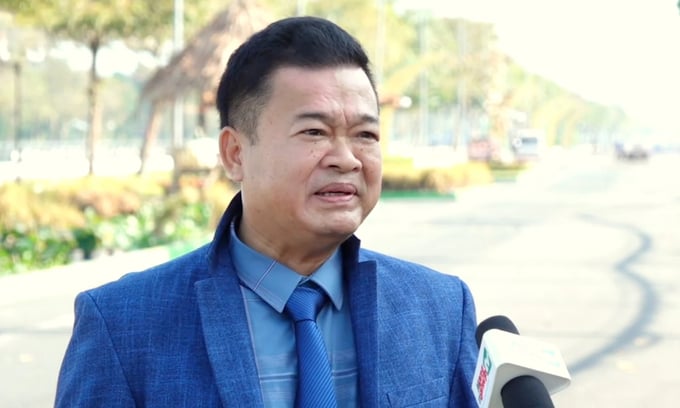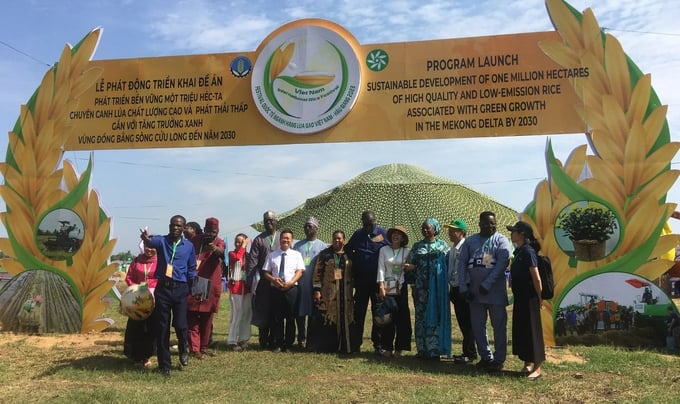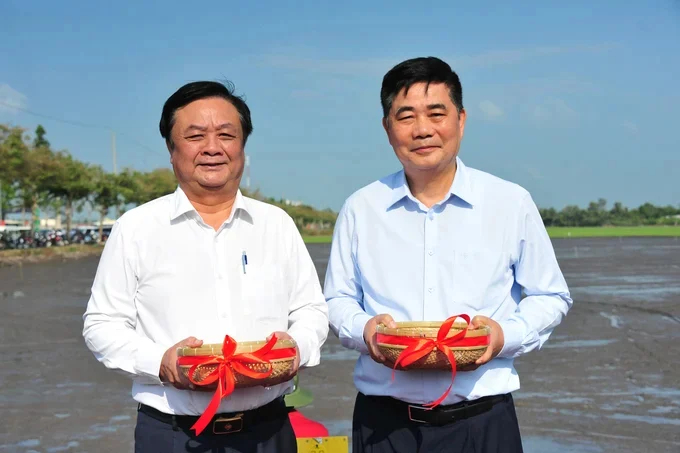June 19, 2025 | 23:46 GMT +7
June 19, 2025 | 23:46 GMT +7
Hotline: 0913.378.918
June 19, 2025 | 23:46 GMT +7
Hotline: 0913.378.918
Vietnam Agriculture Newspaper briefly published the sharing of Mr. Cao Minh Hung, Director of Thap Muoi Clean Agricultural Development Trading Co., Ltd., about the program of 1 million hectares of high-quality rice just launched in the Mekong Delta.

Cao Minh Hung, Director of Thap Muoi Clean Agricultural Development Trading Co., Ltd.
I used to own an electrical construction and installation business. During that time, I occasionally participated in production with farmers and enjoyed it very much.
However, a few decades ago, people still pursued productive agriculture. The amount of seeds, fertilizers and pesticides used is quite large. In particular, people are hardly fully aware of what food and clean food mean for their health. There are even fewer foods with food safety certificates.
Many times, I went plowing with people and noticed something. Soil heavily fertilized with chemical fertilizers is very hard and hard, making it almost impossible for people to plow deeply. Another thing is that because a lot of granular fertilizer is used, the main method is to pump water into the field and spread the fertilizer so that it dissolves on its own.
These things were not true to the farming process of advanced countries at that time. They have advocated organic production, where the soil is plowed and loose, helping fertilizer penetrate deep into the ground and creating conditions for plant roots to spread and develop. In addition, many countries have switched to fertilizer irrigation instead of spraying, which helps reduce the amount of fertilizer and seepage into the ground.
Since the early 2010s, I began to associate with some partners in the United States to research and research clean rice production. After Dong Thap province launched the agricultural sector restructuring, I experimented with bringing fertilizers, pesticides, and new farming processes to transfer to the people. Around 2016, our company imported the first batches of materials and then began to persuade people in this direction.
While being persistent with the people, I contacted many scientists and asked them to come to the field to give more opinions. The first days were quite difficult. Because people already have old ways of thinking and doing things, I persuade them to follow the new process. If there are any problems, I won't be able to speak up.
Not only that. Anyone who does organic farming understands that when following this process, output will likely decrease. That is also an issue that worries many farmers.

Mr. Hung and international delegates attended the Program launching of 1 million hectares of high-quality rice. Photo: Minh Hung.
Thanks to the determination of the entire political system of Dong Thap province, gradually, some people took "risks" with me. It must also be added that Dong Thap, like many Mekong Delta provinces at that time, was under considerable pressure from the generation of young people, who mainly went to factories and plants to work. Some households have problems hiring workers. They couldn't afford to abandon their fields, so I was fortunate to be able to add mechanization and automation to farming, helping to reduce the pressure on people when planting and harvesting.
Little by little, the number of households, as well as the area associated with Thap Muoi Clean Agriculture Company, is increasing. If anyone wants to join the association, I must take them to old fields and invite them to walk barefoot on the organically farmed land. They will feel for themselves that the ground is sinking. When cultivating land, wherever the harrow goes, the soil loosens.
Our rice products are now linked almost throughout the Western provinces such as Dong Thap, Kien Giang, Soc Trang, Bac Lieu, Ca Mau... With time, perhaps people now understand more about high-quality rice. It's the same field, but I put in less effort because I save money on land preparation, sowing, and harvesting, but still ensure an income, or even higher, so why not follow it.
Recently, Vietnam is proud to have Mr. Ho Quang Cua's ST 25 variety recognized as the best in the world. That is a big mental boost for rice growers in the Mekong Delta because everyone knows that branding, especially in the global rice industry, is quite tricky.
The 1 million hectares of high-quality rice program is resonating with that, reducing emissions. Honestly, I heard about this program a while ago, when Mr. Le Minh Hoan was first appointed as Minister of Agriculture and Rural Development. It can be said that the implementation of the program is at this time, when rice prices reach US$ 600/ton and the agricultural sector continues to be a pillar of the economy, especially in difficult times like Covid-19 and rising global inflation, is very timely.
The program is divided into two phases; from now until 2025, the focus will be on developing about 200,000 hectares of rice to inherit the VnSAT Project. I had a little concern about the new deployment areas. They need to be propagated and raise awareness about: High-quality rice is not high-yield rice, it is not productive. High-quality rice also does not mean that rice can be sold at a high price, although these concepts often go hand in hand.
It sounds simple, but convincing people requires persistence in a hand-holding style in the current period of high rice prices. Agricultural extension officers must stay close to the fields to avoid causing unnecessary damage to farmers.

Minister Le Minh Hoan and IRRI Chairman Cao Duc Phat at the program launching of 1 million hectares of high-quality rice. Photo: Tung Dinh.
I think that to effectively implement the program of 1 million hectares of high-quality rice, it is necessary to replicate successful models, specifically from underwritten rice areas, or meet export standards, or from the VnSAT Project itself. By doing so, people can ensure and maintain production processes.
It took us many years to transform the Dong Thap Muoi region into the main rice granary of the country. There, irrigation works play a significant role, helping to ferment and wash alum. Therefore, when implementing 1 million hectares of high-quality rice, I think it is necessary to ensure irrigation systems for new areas, forming enclosures that are convenient for the construction of infrastructure and roads. Along with that, people certainly also need attention and investment in small and medium-sized pumping stations to lower prices and production costs.
Being close to people, I asked many people about the project. Happily, they all agreed to renovate and change farming habits and practices to follow the new process. From the reality implemented in the Mekong Delta provinces, I believe that people will work together, learn from each other, and tell each other to participate in linked chains. When purchasing, traders can also reduce transportation costs.
The long-term benefit of 1 million hectares of high-quality rice, in addition to a green environment for children in the future, is that farmers can take advantage of agricultural by-products such as straw, rice husks, etc. For example, straw from high-quality rice will have nutritional residue, suitable for growing straw mushrooms, or rice husk from high-quality rice will yield better biomass. In particular, through processing technology, rice husks can completely replace natural gas, directly helping people.
Translated by Tuan Huy
![Turning wind and rain into action: [9] Digitizing hydrometeorological data in response to climate change](https://t.ex-cdn.com/nongnghiepmoitruong.vn/608w/files/news/2025/06/17/z6704423696987_15fd32ffc26d590d204d520c9dac6786-nongnghiep-165943.jpg)
(VAN) Farmers have begun accessing hydrometeorological applications to adjust their cropping schedules, aiming to ensure productivity and adapt to climate change.
![Turning wind and rain into action: [8] Real-time salinity detection and early warning technology](https://t.ex-cdn.com/nongnghiepmoitruong.vn/608w/files/news/2025/06/17/z6704423696987_15fd32ffc26d590d204d520c9dac6786-nongnghiep-151127.jpg)
(VAN) Thanks to the integration of modern hydrological-hydraulic models, remote sensing technologies, and artificial intelligence, the accuracy of hydrological forecasting has significantly improved.
![Turning wind and rain into action: [7] Early disaster warnings help marine farmers minimize losses](https://t.ex-cdn.com/nongnghiepmoitruong.vn/608w/files/news/2025/06/17/z6704423696987_15fd32ffc26d590d204d520c9dac6786-nongnghiep-142942.jpg)
(VAN) In recent years, thanks to early disaster warnings and forecasting, marine farmers in Khanh Hoa province have been able to reduce risks and losses, thereby improving production efficiency.
![Turning wind and rain into action: [6] ‘Four on-the-spot’ disaster management software](https://t.ex-cdn.com/nongnghiepmoitruong.vn/608w/files/news/2025/06/17/e5a48259d6a262fc3bb3-nongnghiep-183800.jpg)
(VAN) By simply activating the scenario on the disaster management software, the relevant authorities immediately know how many households need to be evacuated, where to evacuate them to, and by what means of transportation…
![Turning wind and rain into action: [5] Hue applies modern technology in disaster forecasting](https://t.ex-cdn.com/nongnghiepmoitruong.vn/608w/files/news/2025/06/17/z6704423696987_15fd32ffc26d590d204d520c9dac6786-nongnghiep-093938.jpg)
(VAN) In Hue city, modern technology has recently been applied in meteorological and hydrological forecasting and warning, helping to reduce the damage caused by natural disasters.

(VAN) A cutting-edge farming technique being implemented on an experimental ranch in Arizona's Sonoran Desert has already saved a billion gallons of water over five years, according to Civil Eats.

(VAN) Poultry and pig production and the environment can be boosted through enhanced water technology, according to new research.